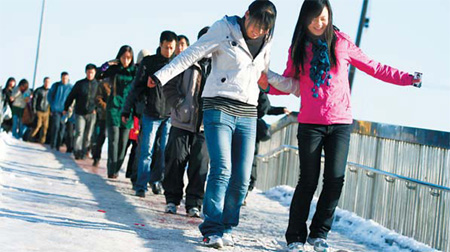Weather office brings selfish snow
|
|
|
People walk across a bridge in downtown Beijing on Monday. |
Beijing residents woke up to a big surprise on Sunday morning when they found the capital city had been blanketed by an unusually heavy snow, the first of the season and the earliest in 22 years according to meteorological statistics.
Before they had time to rejoice over this gift, they were instantly baffled by the city's response.
Beijing was obviously unprepared for the weighty snowfall, seeing an increase in the number of vehicular accidents, delayed flights for passengers, and above all, almost all the city's residents left shivering in houses not primed with winter heating services.
People were asking why there were no accurate forecasts for the extreme weather conditions, calling into question the lack of an efficient emergency plan from city officials.
In the end, most people swallowed their anger and put up with the inconvenience. That was, of course, until word came that the snow had been induced by meteorological offices trying to mitigate the severe drought.
A spokesman from the Beijing Weather Modification Office said on Monday they had played a helping hand and "enhanced" the natural snowfall to ease drought conditions in the city, after it had gone more than 100 days without rain.
A total of 84 packages of silver iodide were fired into the clouds above Beijing between 8pm on Saturday and 7am on Sunday to prompt precipitation, causing 16 million cubic meters of snow to fall on the city. That announcement was met with a deluge of angry criticism from netizens and social commentators, who said this "arbitrary" government decision had disregarded the interests of the people.
While it is perfectly reasonable we need to lend our understanding to the weather bureau for its good intentions, it is also the case that we should consider the potential hazards of cloud seeding.
Media reports said about 200 flights were delayed at Beijing Capital International Airport, leaving hundreds of thousands of passengers stranded. Many bus routes to the city outskirts, including Yanqing county and Tanzhe Temple, were cancelled due to transportation breakdown.
Some passengers were left in cold planes at the capital airport, hungry and without drinking water for up to 20 hours. Kai-Fu Lee, president for the new Chinese incubator Innovation Works, recorded in his blog that some passengers even fainted from a lack of oxygen.
The weather bureau has evaded the question why it failed to notify related transportation departments and civil aviation companies.
Their decision seems even more inconsiderate when we consider those low-income families, migrant workers, and homeless people who must have had a hard time struggling to find a warm place to spend the night.
I believe it is not a question of improving government efficiency and cooperation among different departments, but a question of respecting the rights of the people. That should always be the basis of any government decision.
 0
0 








Comments